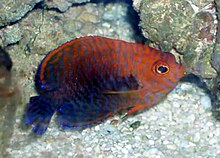Centropyge potteri: Difference between revisions
added new info Tags: Mobile edit Mobile app edit |
+commons cat & wikispecies tmp |
||
| Line 36: | Line 36: | ||
* Reefkeeping [http://reefkeeping.com/issues/2009-03/fish/index.php potteri] |
* Reefkeeping [http://reefkeeping.com/issues/2009-03/fish/index.php potteri] |
||
[[Category:Pomacanthidae]] |
[[Category:Pomacanthidae]] |
||
{{Commons category|Centropyge potteri}} |
|||
{{Wikispecies|Centropyge potteri}} |
|||
Revision as of 23:30, 27 January 2015
| Potter's Angelfish | |
|---|---|

| |
| Scientific classification | |
| Kingdom: | |
| Phylum: | |
| Class: | |
| Order: | |
| Family: | |
| Genus: | |
| Species: | C. potteri
|
| Binomial name | |
| Centropyge potteri (Jordan & Metz, 1912)
| |
Centropyge potteri, Potter's angelfish or the russet angelfish, is a marine angelfish from the Central Pacific Ocean. It is named in honor of Frederick A. Potter, the former director of the Waikiki Aquarium.
Appearance
Potter's angelfish grows to a size of 10 cm (4 in) in length. The fish is orange in color, with the bottom rear part of the fish being dark blue in color. The fish is covered with irregular, close-set, thin, vertical blue stripes. These fish inhabit rocky ledges, where they are found feeding on algae and detritus. This species is essentially hermaphrodite and generally has a dominant male with a harem of females in the wild.
Distribution and habitat
This fish is native to the Johnston Atoll and the Hawaiian Islands in the central Pacific Ocean. Its depth range is 10 to 138 m (33 to 453 ft). It is a bentho-pelagic species and its typical habitat is rock, coral and rubble areas of exposed reefs.[2]
Status
Potter's angelfish has a wide range and is a common reef fish. Collection for the aquarium trade is not excessive and its numbers seem stable so the IUCN lists it as being of "Least Concern".[1]
In the aquarium
Potter's angelfish is generally reef compatible, however, like most dwarf angelfish, it has been known to nip at the polyps of stony corals. It will accept a varied diet of live food, frozen foods, meaty items, flake food and plenty of algae. Potter's angelfish are best kept on their own or in pairs because they will fight with others of their own kind. This fish is peaceful and is generally only aggressive to similar species and its own kind.
References
- ^ a b Template:IUCN2013.2
- ^ "Centropyge potteri (Jordan & Metz, 1912): Russet angelfish". FishBase. Retrieved 2013-12-26.
- Reefkeeping potteri

